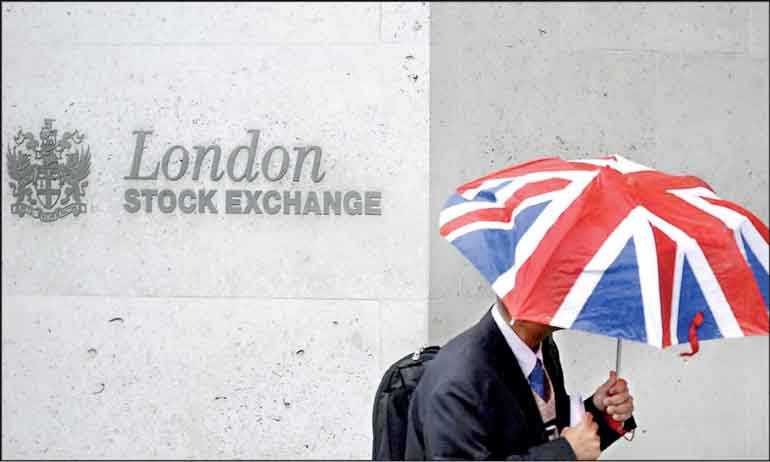Sunday Feb 22, 2026
Sunday Feb 22, 2026
Saturday, 27 June 2020 00:00 - - {{hitsCtrl.values.hits}}

FILE PHOTO: A worker shelters from the rain under a Union Flag umbrella
as he passes the London Stock Exchange in London, Britain, 1 October - Reuters
LONDON (Reuters): Markets showed signs of optimism on Friday, with European shares opening higher and oil prices rising despite a record number of new COVID-19 infections in the United States.
They rose across the US by at least 39,818 on Thursday, the largest one-day increase of the pandemic. The governor of Texas temporarily stopped the state’s reopening on Thursday as infections and hospitalisations surged.
But European shares opened higher, with the Stoxx 600 up 0.8% and London’s FTSE 100 up 1% at 0736 GMT.
The MSCI world equity index, which tracks shares in 49 countries, was up 0.3%, extending gains from late on Thursday.
“Even though we continue to see some pretty scary virus numbers coming out of the US, it’s not really dented sentiment – not to any sustained degree at least,” said Timothy Graf, head of EMEA macro strategy at State Street Global Advisors.
Graf said that recent temporary downward corrections of market optimism have had very little follow-through.
The possibility of a second coronavirus wave and renewed lockdowns has limited market impact because if lockdown measures resume then markets expect this to raise the likelihood of more fiscal support for economies.
“There is a disconnect between what you feel should be the case looking at virus numbers and equities and riskier currencies holding up relatively well and volatility receding, but at the same time we’ve never seen a policy response like this, not in the last 80 years at least,” Graf said.
Having risen between 0500 and 0700 GMT, the dollar fell in early London trading to 97.317 against a basket of currencies by 0745 GMT.
The riskier New Zealand dollar was up 0.2%, having spent most of June at the level it was at before the coronavirus crisis for markets peaked in March.
Oil prices rose on Friday, extending gains on optimism about a recovery in fuel demand worldwide, despite signs of a revival in US crude production.
US West Texas Intermediate (WTI) crude futures gained 26 cents, or 0.7%, to $ 38.98, while Brent crude futures rose 36 cents, or 0.9%, to $ 41.41.
The US Senate passed legislation that would impose mandatory sanctions on people or companies that back efforts by China to restrict Hong Kong’s autonomy, in another potential Sino-US flashpoint. To become law it must also pass the House and be signed by President Donald Trump. Support for pro-democracy demonstrations in Hong Kong has slipped, though retains the backing of a slim majority, a survey conducted for Reuters showed.
But demand for safe euro zone government debt was little changed, with Germany’s 10-year Bund yield close to monthly lows, at -0.479%.
The yield on benchmark 10-year Treasuries was steady at 0.6725%. Gold edged up slightly to $ 1,763.65 an ounce. The pandemic is more likely to leave a legacy of weak or falling prices for goods and services than to trigger higher global inflation, according to a majority of over 160 economists polled by Reuters.
The euro zone is “probably past” the worst of the economic crisis caused by the pandemic, European Central Bank President Christine Lagarde said on Friday, while urging authorities to prepare for a possible second wave.
“There’s still a belief that the unemployment that we see is temporary, there’s still a belief that businesses will be able to get back to normal, but it’s probably right to think that that’s a little too simple,” said State Street’s Graf.